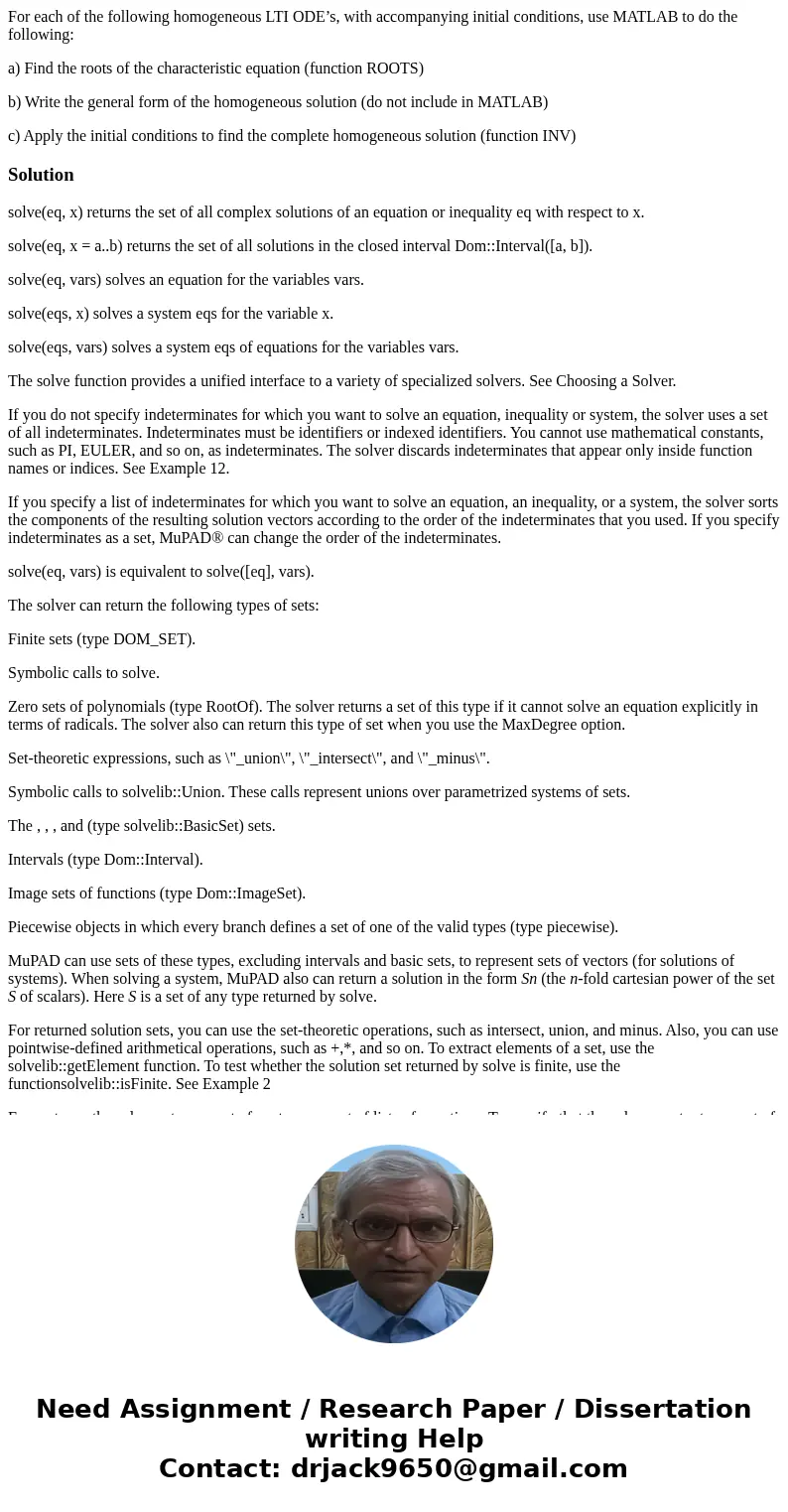For each of the following homogeneous LTI ODEs with accompan
For each of the following homogeneous LTI ODE’s, with accompanying initial conditions, use MATLAB to do the following:
a) Find the roots of the characteristic equation (function ROOTS)
b) Write the general form of the homogeneous solution (do not include in MATLAB)
c) Apply the initial conditions to find the complete homogeneous solution (function INV)
Solution
solve(eq, x) returns the set of all complex solutions of an equation or inequality eq with respect to x.
solve(eq, x = a..b) returns the set of all solutions in the closed interval Dom::Interval([a, b]).
solve(eq, vars) solves an equation for the variables vars.
solve(eqs, x) solves a system eqs for the variable x.
solve(eqs, vars) solves a system eqs of equations for the variables vars.
The solve function provides a unified interface to a variety of specialized solvers. See Choosing a Solver.
If you do not specify indeterminates for which you want to solve an equation, inequality or system, the solver uses a set of all indeterminates. Indeterminates must be identifiers or indexed identifiers. You cannot use mathematical constants, such as PI, EULER, and so on, as indeterminates. The solver discards indeterminates that appear only inside function names or indices. See Example 12.
If you specify a list of indeterminates for which you want to solve an equation, an inequality, or a system, the solver sorts the components of the resulting solution vectors according to the order of the indeterminates that you used. If you specify indeterminates as a set, MuPAD® can change the order of the indeterminates.
solve(eq, vars) is equivalent to solve([eq], vars).
The solver can return the following types of sets:
Finite sets (type DOM_SET).
Symbolic calls to solve.
Zero sets of polynomials (type RootOf). The solver returns a set of this type if it cannot solve an equation explicitly in terms of radicals. The solver also can return this type of set when you use the MaxDegree option.
Set-theoretic expressions, such as \"_union\", \"_intersect\", and \"_minus\".
Symbolic calls to solvelib::Union. These calls represent unions over parametrized systems of sets.
The , , , and (type solvelib::BasicSet) sets.
Intervals (type Dom::Interval).
Image sets of functions (type Dom::ImageSet).
Piecewise objects in which every branch defines a set of one of the valid types (type piecewise).
MuPAD can use sets of these types, excluding intervals and basic sets, to represent sets of vectors (for solutions of systems). When solving a system, MuPAD also can return a solution in the form Sn (the n-fold cartesian power of the set S of scalars). Here S is a set of any type returned by solve.
For returned solution sets, you can use the set-theoretic operations, such as intersect, union, and minus. Also, you can use pointwise-defined arithmetical operations, such as +,*, and so on. To extract elements of a set, use the solvelib::getElement function. To test whether the solution set returned by solve is finite, use the functionsolvelib::isFinite. See Example 2
For systems, the solver returns a set of vectors or a set of lists of equations. To specify that the solver must return a set of vectors, use the VectorFormat option. See Example 10.
By default, solve(eq, x) returns only the solutions consistent with the properties of x. To ignore the properties of x, use the IgnoreProperties option. This option is helpful when you solve a system of equations for more than one variable. See Example 13.
An inequality a <= b or a < b holds only when both sides represent real numbers. In particular, a = b does not imply that a <= b for complex numbers.
You can write custom domains for equations of special types, and then overload solve for these domains. MuPAD uses this feature for differential and recurrence equations. See the ode, ode::solve, and rec help pages.
The solve function is a symbolic solver. If you want to use numeric methods, see the numeric::solve help page for available options


 Homework Sourse
Homework Sourse